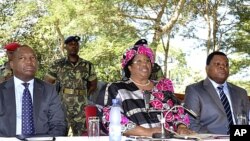Malawi’s new president originally rose to prominence as a women’s rights advocate. But Shereen Essof, a regional coordinator for feminist group Just Associates in Southern Africa, says President Joyce Banda may not be able to continue the battle for gender equality in the same way as president.
She said Banda is facing a “political terrain [that] is very, very loaded.”
The new president has been sworn in, Essof added “at a time when, in the region, there are a kind of corralling of very conservative forces that work against advancing rights for women.”
For one, she explained, Malawi’s leaders have been moving the country towards increased privatization, which means the government is no longer subsidizing a number of social services that were focused on helping women, such as improving access to healthcare, housing and water.
She said an evolution in religious attitudes is also affecting women in the southern African country.
“There’s also a move of fundamentalism in the region, particularly Christian fundamentalism and more conservative articulations of gendered roles in regards to men and women and that plays out in very, very specific ways,” she added.
Essof said the women of Malawi currently suffer a number of inequalities - restrictions that range from how they can dress to their economic opportunities.
“Joyce Banda has definitely come out in different ways in support of women’s rights and economic empowerment,” Essof said. The new president once established the Joyce Banda Foundation for girls’ education.
That kind of advocacy is important, Essof said, in a country where a majority of women in Malawi live in rural areas, where literacy rates are low
Essof said she hopes Banda will continue this work as president despite the challenges.
Among other pressing issues, Malawi’s women need an advocate for their access to low-cost, high-quality HIV medications, she added.
Nearly 60 percent of the adults living with AIDS in Malawi are women. Essof said their access to life-saving drugs is at risk, because “there have been cutbacks in the funding/support of ART.”
Banda was sworn in late last week after the death of President Bingu wa Mutharika.
